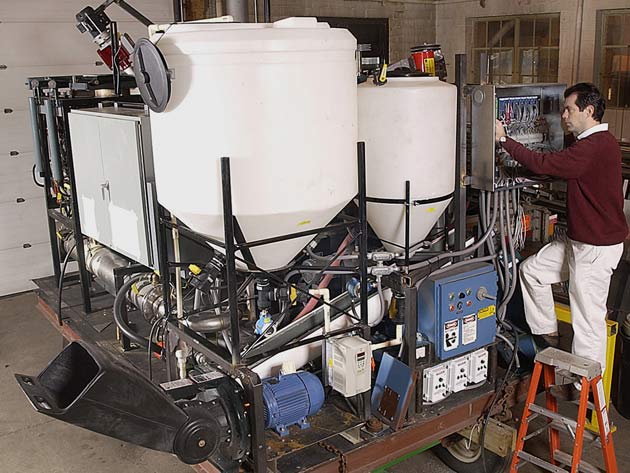Portable Refinery Makes Fuel from Food Scraps and Trash

The tactical biorefinery is a portable machine that can convert food waste and inorganic trash into electricity. Purdue University researchers created a unique hybrid design for the U.S. Army. It uses three distinct technologies to perform its magic:
- A bioreactor that uses enzymes and micro-organisms to turn food waste into ethanol
- A gasification unit that turns plastics, paper, and other residual waste into methane and low-grade propane and
- A modified diesel engine that can burn gas, ethanol, and diesel fuel in variable proportions.
Diesel fuel is used during the first few hours of operation; then mess tent garbage is fed in. The resulting ethanol and gas displaces the diesel fuel (which continues in a very low quantity "drip").
The Purdue project initially studied the typical waste streams that soldiers produce in the field to select the best energy-conversion technologies. A biocatalytic process was chosen to deal with the food portion of the waste. The trick was to get the pH balance and temperature right for the mixture of enzymes and microorganisms the researchers selected. For plastics, wood, and other nonfood waste that can't be broken down in a bioreactor, a gasifier was developed that exposes the material to extreme heat in a low-oxygen environment.
It is hoped that the system can be shrunk down to the size of a Humvee trailer; it would be an ideal system for use in disaster-relief efforts as well as in the field by the military.
There is an interesting precursor in science fiction, if you are willing to stretch your view of what constitutes 'sf.' In his wonderful 1726 social satire Gulliver's Travels, author Jonathan Swift actually writes about a project to extract energy from vegetation:
He has been eight years upon a project for extracting sunbeams out of cucumbers, which were to be put in phials hermetically sealed, and let out to warm the air in raw inclement summers. He told me, he did not doubt, that, in eight years more, he should be able to supply the governor's gardens with sunshine, at a reasonable rate: but he complained that his stock was low, and entreated me to give him something as an encouragement to ingenuity, especially since this had been a very dear season for cucumbers. (Read more about Jonathan Swift's bio-energy)
I also can't resist this other reference. Okay, it's not Mr. Fusion (see photo), the mass to energy converter of Back to the Future fame, but maybe it's more practical.
Now, thanks to this tactical biorefinery that uses garbage from the mess tent to create electricity, an army not only "marches on its stomach," it also runs its camp on it. (You know what I mean.)
Check out these other bio-energy articles:
Get the world’s most fascinating discoveries delivered straight to your inbox.
From A Portable Refinery Powered by Garbage.
(This Science Fiction in the News story used with permission from Technovelgy.com - where science meets fiction.)


